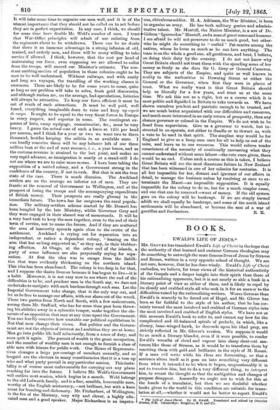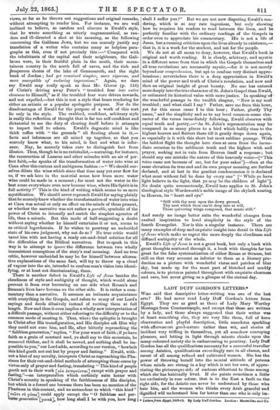BOOKS.
EWALD'S LIFE OF JESUS.*
Ma. GLOVER has translated Ewald's Life of Christ in the hope that the authority of that learned and eminent German theologian may do something to outweigh the more famous lives of Jesus by Strauss and Renan, written in a very opposite school of thought. We are not sure, however, that he has done wisely. Ewald's Life of Christ embodies, we believe, far truer views of the historical authenticity of the Gospels and a deeper insight into their spirit than those of his rationalizing opponents, but it is not nearly so able a book in a literary point of view as either of them, and is likely to repel by its cloudy and crabbed style all who seek in it for an answer to the difficulties raised by the rationalizing writers. Worse German than Ewald's is scarcely to be found out of Hegel, and Mr. Glover has been so far faithful to the style of his author, that he has cer- tainly turned the most involved and crabbed of German styles into the most involved and crabbed of English styles. We have not at this moment Ewald's book to refer to, and cannot say how far the complicated and ill-balanced spirals of prelude, in which, like a clumsy, lame-winged hawk, he descends upon his ideal prey, are strictly reflected in Mr. Glover's version. We suppose it would be as much a literary blunder, even if it were possible, to render Ewald's wreaths of cloud and vapour into sharp clear-cut sen- tences like those of Strauss, as it would be to transform them by resetting them with gold and brilliants in the style of M. Reuan. If a man will write while his ideas are fermenting, so that a sentence alters itself as it goes on into something very different from what it intended to be when it began, unquestionably it is not to translate him, but to do a very different thing, to interpret him, to recast the thought so that the ambiguities and changes of purpose disappear. Assuredly we ought not to wish for this at the hands of a translator, but then we are doubtful whether books given to the world in this condition are suitable for trans- lation at all,—whether it would not be better to report Ewald's
The Life of Jesus Christ. By H. Harald. Translated and edited by Octevius Glover, R.D. Cambridge: Deighton, 13 and Co.
views, so far as he throws out suggestions and original remarks, without attempting to render him. For instance, we are well inclined to believe, so careless and obscure is Ewald's style, that he wrote something as utterly ungrammatical, as ran- dom and ill-directed a shot at his meaning, as the following concerning the Galihean Jews, but we can scarcely justify any translation of a writer who contains many as helpless para- graphs as this, even if not precisely this :—" Compared with the inhabitants of the capital and their neighbours, the Gali- Imams were, in their fruitful plain in the south, their moun- tainous country in the north full of caves, and the rich and ilrosperous shores of the lake of Gennesareth, and the right bank of Jordan ; had yet remained simpler, more vigorous, and more susceptible of enduring impressions." Again, we dare say Ewald may really speak as does Mr. Glover (p. 116) of Christ's driving away Peter's " troubled fear into entire closeness to Himself," as if the troubled fear were driven inwards, and not expelled,—but this is not a style that bears rendering for either an artistic or a popular apologetic purpose. Nor do the disadvantages of Ewald for the purpose of a work of this sort lie only in the style. The crabbed, confident, arbitrary style is really the reflection of thought that is far too self-confident and dictatorial to see the duty of clearing itself before it attempts to impart itself to others. Ewald's dogmatic mind is like thick coffee with " the grounds " all floating about in it, — facts and inferences are all mixed up together, so that you scarcely know what, to his mind, is fact and what is infer- ence. Nay, he scarcely takes care to distinguish fact from illusion. Thus, though he is no ratiobalist,— narrating, for instance, the resurrection of Lazarus and other miracles with an air of per- fect faith, —he speaks of the transformation of water into wine at Cana after this curious and ambiguous fashion :—" We should our- selves dilute the wine which since that time may yet ever flow for us, if we ask here in the material sense how from mere water wine could be made in a moment ; for must not the water in the best sense everywhere even now become wine, where His Spirit is in full activity ?" This is the kind of writing which seems to us mere mystification. We should never reproach Ewald for saying plainly that he scarcelyknew whether the transformation of water into wine at Cana was actual or only an effect on the minds of those present, or whether the narrative was not rather a parable, symbolic of the power of Christ to intensify and enrich the simplest agencies of life, than a miracle. But this mode of half-suggesting a doubt without saying whether he himself entertains it or not, seems to us critical legerdemain. If he wishes to pourtray an undecided state of his own judgment, why not do so ? No true critic would taunt him with not having a ready cut-and-dried solution for all the difficulties of the Biblical narratives. But to speak in this way is to attempt to ignore the difference between two wholly inconsistent conceptions of the story's real meaning. And no true critic, however undecided be may be for himself between alterna- tive explanations of the same fact, will try to throw up a cloud of vapour into the air, intended to confuse men's vision into identi- fying, or at least not discriminating, them.
There is another defect in Ewald's Life of Jesus besides the cloudiness of style and ambiguity of thought, which would alone prevent it from ever becoming on one side what Renan's and Strauss's lives have become on the other side. It is rather a com- mentary than a narrative. It assumes an intimate acquaintance with everything in the Gospels, and refers to many of our Lord's sayings and deeds allusively instead of reciting them at full length. Now and then it even implies a wholly new interpretation of a difficult passage, without either referring to the difficulty or to the common mode of meeting it. Thus, where the epileptic is brought to Christ after His transfiguration, and His disciples ask Him why they could not cure him, and He, after bitterly reproaching the " faithless generation," replies, " For your want of faith ; if ye have faith as a grain of mustard seed, ye shall say to this mountain, be removed thither, and it shall be moved, and nothing shall be im- possible to you," our Lord adds, according to our version, "howbeit this kind goeth not out but by prayer and fasting." Ewald, with- out a hint of any novelty, interprets Christ as reproaching the Pha- risees for their cut-and-dried methods of attempting these cures by virtue only of prayer and fasting, translating " This kind of people goeth not to their work Cola ixmropeLsrco] except with prayer and fasting,"--an interpretation which certainly suits better with Christ's severity in speaking of the faithlessness of His disciples, but which is a forced one because there has been no mention of the Pharisees in this context, and no antecedent to which "this kind" [rain rb yivog] could apply except the " 0 faithless and per- verse generation [vEvEet], how long shall I be with you, how long shall I suffer you?" But we are not now disputing Ewald's ren- dering, which is at any rate ingenious, but only showing how he requires his readers to read between the lines, and be perfectly familiar with the ordinary readings of the Gospels in order even to appreciate his commentary. His is not a life of Jesus, but a running criticism upon the lives already in existence,— that is, it is a work for the student, and not for the people.
We do not at all mean to deny, however, that Ewald's book is original and worth reading. It is cloudy, arbitrary, and mystic in a different sense from that in which the Gospels themselves and all true revelations are necessarily mystic,—for it is not merely beyond our comprehension, but apt to confuse very distinct appre- hensions; nevertheless there is a deep appreciation in Ewald's mind of the power and truth of Christ's revelation, and now and then an original insight of great beauty. No one has entered more deeply into the true character of St. John's Gospel than Ewald, or estimated its historical value with more justice. In speaking of the wonderful passage in the twelfth chapter, 'Now is my soul troubled ; and what shall I say? Father, save me from this hour, yet for this cause came I to this hour ; Father, glorify Thy name," and the simplicity and so to say level common-sense cha- racter of the verses immediately following, Ewald observes with equal truth and poetry,—"As St. John's representation may be compared in so many places to a bird which boldly rises to the highest heaven and flutters there till it gently drops down again, so especially is it with this short but most sublime passage. With the boldest flight the thought here rises at once from the imme- diate occasion to the sublimest truth and the highest wish and prayer, seeking not in vain from Heaven itself a response ; but should any one mistake the nature of this heavenly voice—[" This voice came not because of me, but for your sakes"]—then at the same elevation its true end and its own proper meaning are further declared, and at last in the gentlest condescension it is declared what must without fail be done by every one" [" While ye have light believe in the light, that ye may be the children of light"]. No doubt quite unconsciously, Ewald here applies to St. John's theological style Wordsworth's noble image of the skylark soaring to Heaven, its " heart and eye"
"Still with thy nest upon the dewy ground, Thy nest which thoa can'st drop into at will, Those quivering wings composed, that music still."
And surely no image better suits the wonderful changes from exalted inspiration to level simplicity in the style of the fourth Evangelist. Nor is this a singular instance. There are many examples of deep and exquisite insight into detail in this Life of Jesus which make us regret the more deeply the cloudiness and diffused ambiguity of the whole.
Ewald's Life of Jesus is not a great book, but only a book with great thoughts scattered through it, a book with thoughts far too great for the false systematization of either Renan or Strauss, but still on that very account as inferior to them as a literary pro- duction as a picture with wonderful vistas and patches of blue sky, but made up for the most part of blotched and muddy colours, is to pictures painted throughout with exquisite clearness and care, but never giving us a glimpse of the eternal day.































 Previous page
Previous page